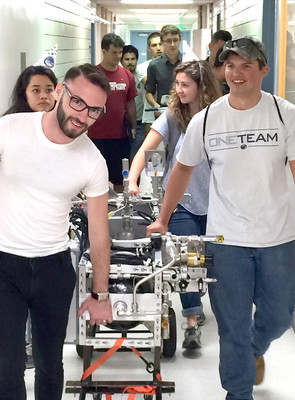Sep 1 2015
Penn State's Lunar Lion team has announced that it is withdrawing from the Google Lunar XPRIZE competition — however, the program continues with the goal of landing a spacecraft on the Moon within the next decade.
 Lunar Lion students moving the Puma lander prototype for in-field testing in August 2015. Image: Penn State Lunar Lion
Lunar Lion students moving the Puma lander prototype for in-field testing in August 2015. Image: Penn State Lunar Lion
In 2011 the Penn State Lunar Lion team joined 28 other teams in the Google Lunar XPRIZE Competition, a challenge to researchers from around the globe to build and launch a privately funded spacecraft capable of completing a series of exploration and imaging tasks. Teams competed to be the first to place a vehicle on the moon’s surface by a deadline of Dec. 31, 2015.
As this deadline approached, the University called upon an independent panel to review the mission’s status and make recommendations. This panel of experts in planetary landing systems, program formulation and space exploration recognized the vision and successes of the team. Experts acknowledged the progress that students had made, and strongly advised that Penn State continue the program outside of the requirements of the XPRIZE competition.
The reviewers were particularly pleased with the innovative approach the students have taken on landing system design, and the agile program development methods employed by the project. The panel praised the team’s hands-on experience in areas such as propulsion, safety procedures and media relations, noting in particular the students’ obvious motivation and passion for space exploration.
The University has already begun implementation of the panel’s recommendations, such as the establishment of a credit-bearing course for participating students. Currently the team is working on its first lander prototype using throttled hydrogen peroxide engines to test propulsion and guidance systems. Prototype testing began this summer and will continue as the fall semester ramps up. Future anticipated developments include closed-loop flight controls, optical navigation and advanced rocket engine design. The review panel also recommended a series of successive development projects to engage many generations of Penn State students in pursuit of a lunar mission.
Having been the only university-led team competing for this XPRIZE, the student team members remain enthusiastic about the mission and the future of Lunar Lion. Student Team Leader Max Winn (aerospace engineering, class of 2018) points out that the students are “enthusiastic to leave the competition and pursue the mission on our own terms.” The program now has an expanded window of opportunity, and has already paid dividends to its student members — not only in terms of real-world research engagement during their academic careers but also after graduation.
The evaluation of Lunar Lion’s progress by the visiting team of experts concluded that the project would not achieve the tight deadline constraints imposed. “We knew the timing was tight from the beginning, but we wanted to give it our all and we definitely want to continue on our path to the Moon. The most important aspect of our original mission — student opportunities in space exploration — remains the same as we continue the Lunar Lion program,” said Michael V. Paul, team lead and director of space systems initiatives at Penn State's Applied Research Lab. "It was great to see our students present their designs to the review panel. They did a great job, eliciting reviewer comments like 'I wish I had a program like this when I was in college.' "
The Lunar Lion program, with private sponsor support, over time has evolved into an organization comprising hundreds of students from a wide range of disciplines including engineering, business, information sciences, communications and astronomy.
“As members of the Lunar Lion team complete their degrees, they are using the skills acquired through this project to secure the jobs and internships they want, in the careers of their choice,” said Paul. “Many companies on the cutting edge of the space industry — including Lockheed Martin, SpaceX, Northrop Grumman and Virgin Galactic, among others — now employ Lunar Lion alumni, and we expect this trend to continue.”
Continued donor support is vital as the team moves toward its goal in the coming decade, said Paul.
“Thanks to our donors' generous sponsorship of the Lunar Lion program, Penn State is the first university to inspire and empower its students to pursue space exploration through a tangible and challenging program to land a spacecraft on the moon.”